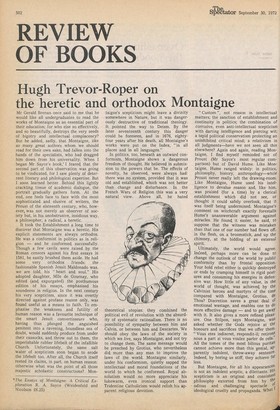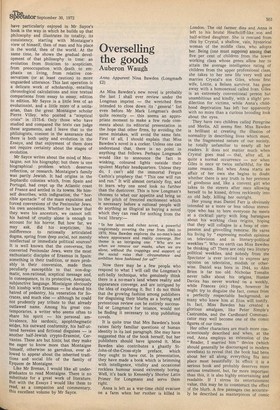Hugh Trevor-Roper on the heretic and orthodox Montaigne
*The Essays of Montaigne: A Critical Exploration R. A. Sayce (Weidenfeld and Nicolson £6.25)
Mr Gerald Brenan once said to me that he would like all undergraduates to read the works of Montaigne as an essential part of their education; for who else so effectively, and so beautifully, destroys the very seeds of bigotry and intellectual complacency? But he added, sadly, that Montaigne, like so many great authors whom we should read for their own sake, had fallen into the hands of the specialists, who had dragged him down from his universality. When I began Mr Sayce's book, I feared, that the second part of this observation was going to be vindicated, for I saw plenty of deterrent literary and philological expertise. But I soon learned better. Behind this lightly crackling tissue of academic dialogue, the portrait gradually gathers form. At the end, one feels face to face with the most sophisticated and elusive of writers, the Proust of the sixteenth century, who, however, was not merely an observer of society but, in his unobstrusive, insidious way, a philosopher, a radical, a heretic.
It took the Establishment a long time to discover that Montaigne was a heretic. His explicit statements are always orthodox. He was a conformist in politics as in religion — and he conformed. successfully. Though a few cavils were raised by the Roman censors against his first essays in 1581, he easily brushed them aside. He had some very orthodox friends: the fashionable Spanish Jesuit Maldonado was, we are told, his "heart and soul." His adopted daughter, Mlle de Gournay, who edited (and, expurgated) the posthumous edition of his essays, emphasised his soundness in religion. In the next century his very scepticism, since it was overtly directed against profane reason only, was found useful as a means to faith. To emphasise the weakness and futility of human reason was a favourite technique of the smart Jesuit convertisseurs who, having thus plunged the anguished penitent into a ravening, boundless sea of doubt, would suddenly produce from under their cassocks, and, throw out to them, the imperishable rubber lifebelt of the infallible Church. Unfortunately, the same salt water of scepticism soon began to erode the lifebelt too. After all, the Church itself rested its claims, in part, on human reason: otherwise what was the point of all those majestic scholastic constructions? Mon taigne's scepticism might leave a divinity somewhere in Nature, but it was dangerously destructive of traditional theology. It pointed the way to Deism. By the later seventeenth century this danger could be foreseen, and in 1676, eightyfour years after his death, all Montaigne's works were put on the Index, "in all places and in all languages."
In politics, too, beneath an outward conformism, Montaigne shows a dangerous freedom of thought. He believed in submission to the powers that be. The effects of novelty, he observed, were always bad: there was no system, provided that it was old and established, which was not better than change and disturbance. In the French Wars of Religion this was a very natural view. Above all, he hated theoretical utopias: they combined the political evil of revolution with the absurdity of systematic rationalism. There is no possibility of sympathy between him and Calvin, or between him and Descartes. We should obey the laws of the society in which we live, says Montaigne, and not try to change them. The same message would be preached by Grotius, who nevertheless did, more than any man to improve the laws of the world. Montaigne similarly, under his conformism, quietly sapped the intellectual and moral foundations of the world to which he conformed. Royal absolutism would no more appreciate his lukewarm, even ironical support than Tridentine Catholicism would relish his apparent religious devotion. "Custom ", not reason in intellectual matters; the sanction of establishment and continuity in politics; the combination of corrosive, even anti-intellectual scepticism with darting intelligence and piercing wit; a tepid political conservatism protecting an uninhibited critical mind; a relativism in all judgments—have we not seen all this elsewhere? Again and again, reading Montaigne, I find myself reminded not of Proust (Mr Sayce's most regular comparison) but of David Hume. Like Montaigne, Hume ranged widely: in politics, philosophy, history, anthropology—while Proust never really left the drawing-room. Like Montaigne, Hume used his intelligence to devalue reason and, like him, was praised (for a time) by a clerical estab,lishment which did not see, or thought it could safely overlook, that it was itself being undermined. Montaigne's comment on witchcraft exactly forestalls Hume's unanswerable argument against miracles. He found it easier, he said, to suppose that the witness was mistaken than that one of our number had flown off, in the flesh, on a broomstick, .and up the chimney, at the bidding of an external spirit.
Ultimately, the world would agree. Indeed, perhaps more can be done to change the outlook of the world by public conformity than by frontal opposition. Your bold rebel either is quickly destroyed or ends by cramping himself in rigid postures and consuming his energies in defensive war. How little of any value, in the world of thought, was achieved by the Calvinist heroes and martyrs of the time compared with Montaigne, Grotius, de Thou? Discretion saves a great deal of emotional wastage, and enables one to do more effective damage — and to get awaY with it. It also gives a more refined pleas' ure. One Stilpon, says Montaigne, was asked whether the Gods rejoice at the honours and sacrifices that we offer thern. " Vous etes indiscret, respondit-il; retirofl! nous a part si vous voulez parler de cela. All the tomes of the most bilious puritan cannot achieve more than this genial, apparently indolent, throw-away sentence. Indeed, by boring us stiff, they achieve far less.
But Montaigne, for all his appearance!, is not an indolent sceptic, a dilettante. HI5, scepticism is an original and consistent philosophy extorted from him by thef odious and challenging spectacle ° ideological cruelty and propaganda. What 1 have particularly enjoyed in Mr Sayce's book is the way in which he builds up that philosophy and illustrates its totality, its consistency, starting with Montaigne's view of himself, then of man and his place in the world, then of the world. At the same time, he shows the gradual development of that philosophy in time: an evolution from Stoicism to scepticism, from preoccupation with death to emphasis on living, from relative conservatism (or at least caution) to more unguarded utterance. This last operation is a delicate work of scholarship, entailing chronological calculations and nice textual comparisons from essay to essay, edition to edition. Mr Sayce is a little less of an evolutionist, and a little more of a unitaarian, than the great Montaigne scholar Pierre Villey, who posited a "sceptical crisis" in 1575-6. Only those who have studied and compared the texts can judge these arguments, and I leave that to the philologists, content in the assurance that there is both unity and evolution in the Essays, and that enjoyment of them does not require certainty about the stages of evolution.
Mr Sayce writes about the mind, of Montaigne, not his biography; but there is one biographical problem which deserves reflection, or research. Montaigne's family was partly Jewish. It had origins in the Sephardic colonies which, from Spain and Portugal, had crept up the Atlantic coast of France and settled in its towns. He himself describes, with indignation, the "horrible spectacle" of the mass expulsion and forced conversions of the Peninsular Jews, his own ancestors. Whether he knew that they were his ancestors, we cannot tell: his hatred of cruelty alone is enough to account for his horror. But how far, we may ask, did his scepticism, his indifference to rationally articulated dogma, spring from deep social, not merely intellectual or immediate political sources? It is well known that the conversos, the converted Peninsular Jews, were the most enthusiastic disciples of Erasmus in Spain: something in their tradition, or more probably in their conversion, made them peculiarly susceptible to that non-dogmatic, non-rational, sceptical message and, in consequence, to its protective, Aesopian, subjunctive language. Montaigne obviously felt kinship with Erasmus — he shared his hatred of pedantry, his veneration for Socrates, and much else — although he could not prudently pay tribute to that already outlawed name. Among his great contemporaries, a writer who seems often to share his spirit — his personal ambivalence, his sardonic, apophthegmatic asides, his outward conformity, his half-uttered heresies and fictional disguises — is another half-Jewish crypto-Erasmist, Cer
vantes. These are but hints; but they make me eager to know more than Montaigne himself, otherwise so garrulous, ever al lowed to appear about the inherited traditions and social life of the family of Eyquem de Montaigne.
Like Mr Brenan, I would like all undergraduates to read Montaigne. There is no
substitute for a great work of literature. But with the Essays I would like them to read, as a companion and commentary, this excellent volume by Mr Sayce.











































 Previous page
Previous page